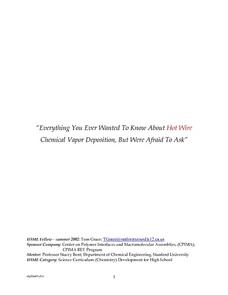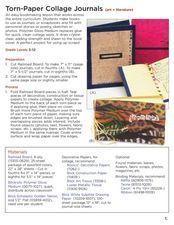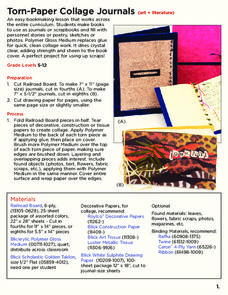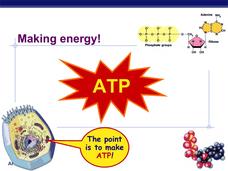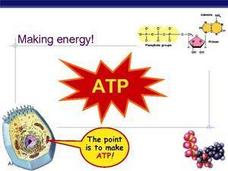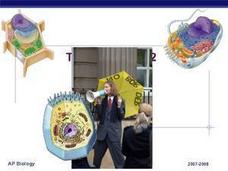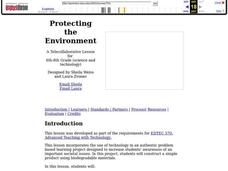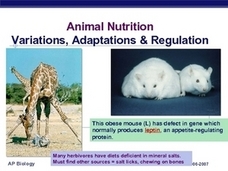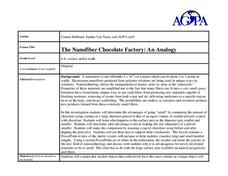Curated OER
Where to Live?
Students examine types of spatial data found in a GIS. In this geography instructional activity students use a GIS to facilitate analysis and decision making.
Curated OER
Everything You Ever Wanted To Know About Hot Wire Chemical Vapor Deposition, But Were Afraid To Ask
To wrap up your year of general chemistry, have lab groups compete in a tot wire chemical vapor deposition (HWCVD) competition. With their foundation in chemical nomenclature, stoichiometry, and gas laws, each group completes several...
Curated OER
Electromagnetic Energy and Its Spectrum
Your older elementary students investigate electromagnetic energy and the electromagnetic spectrum. They will observe 7 items represented in the electromagnetic spectrum and make a poster of all the things the items have in common. After...
Curated OER
Torn Paper Collage Books
An excellent lesson on bookmaking awaits your students! This simple, and easy-to-implement plan should provide you with some excellent student-made products that you'll be proud to send home with them. The instructions are clear, and the...
Dick Blick Art Materials
Torn-Paper Collage Journals
Young writers personalize their journals by making their own. Whether they make covers for existing journals or make their own books, the activity encourages kids to express themselves in words and images.
Science Geek
Basic Biochemistry - Carbohydrate, Protein and Fat
You are what you eat, right down to your molecular structure. A hearty presentation begins with the two types of carbohydrates, simple and complex. Then it details proteins and amino acids. It ends by reviewing the three types of...
Dick Blick Art Materials
Painted Lockets
Painted, portable, pocket lockets encourage kids to display personal treasures and items they value. The activity, combining art with social and character studies, is perfect for any classroom.
Curated OER
Making Energy: ATP
The main concepts behind how ATP transfers energy are explained in this Ap Biology PowerPoint. The diagrams convey the information that students need for any test regarding phosphorylation. The steps are clear, and should help...
Curated OER
The Point is to Make ATP
Storing and transferring energy is explained here with reference to the fight or flight response, along with the need for activity in times of lowered nutrition. This is a great summary of ATP applications, and after the multiple stages...
University of California
You Are What You Eat: Testing for Organic Compounds in Foods
We have all heard that we are what you eat, but what are we eating? An informative lesson opens with a discussion of the foods pupils have recently eaten. Then, young scientists perform four experiments on seven...
Curated OER
Tour of the Cell 2
As your class views each slide, they will be introduced to the organelles and structure of the cell. Details about structure and function are given and also some trivia about their frequency and population. There is also some...
Nuffield Foundation
Going up in Smoke
Don't let all your hard work go up in smoke. Pupils conduct an experiment to see the harmful effects of cigarette smoke. They observe how smoke changes the color of white wool and an indicator solution.
Curated OER
How Sticky Is Your Tape?
Pupils test the adhesive properties of different sticky tapes. In this chemistry lesson, students collect data from the experiment by measuring how far the marble rolls down the track. They share their findings to the class.
Curated OER
Plastics Crossword
In this chemistry worksheet, students look for the solutions to the crossword puzzle that is based upon the topic of plastics. The sheet is helpful for vocabulary.
Curated OER
Protecting the Environment
Learners explain what biodegradable materials are and list examples of them. They design, with online partners' feedback and input, a product made of biodegradable materials and develop a marketing campaign to best sell their product.
Curated OER
Properties and Perfectly Polymeric Sodas
Students examine physical and chemical properties of plastics, interfaces of plastics, and forms of plastics. In three lab activities, students discover the two characteristic responses of plastics to heating, thermoplastic or...
Curated OER
Percentage Composition
In this chemical compounds worksheet, students determine the empirical formula or the molecular formula for the compounds given. Students calculate percent composition. This worksheet has 10 problems to solve.
Curated OER
Percentage Composition and Empirical & Molecular Formula
In this compounds instructional activity, students determine the empirical and molecular formulas for given compounds. This instructional activity has 10 problems to solve.
Curated OER
Animal Nutrition - Variations, Adaptations, & Regulation
Colorful pictures and graphics make this a visually-appealing presentation on animal nutrition. Be aware that two of the sixteen slides include blank graphic organizers, so you will need to find the other existing version of this...
Curated OER
Applied Science - Science and Math Lab
Students examine fabric. For this Applied Science lesson, students look at the fibers of fabric through a microscope. Students compare and contrast a variety of fibers.
Curated OER
Biodegradability
Students study the effects of water, salt water and heat on common household materials. They separate an emulsion and show that the materials are completely recoverable and observe the effect of acetone and water on polystyrene.
Curated OER
The Influence of Carbon Dioxide on the Chemistry of Soda
Students investigate the carbon dioxide content of different sodas. In this chemistry lesson, students explain why PET containers are preferable than HDPE for soda bottles. They collect data and graph them.
Curated OER
The Nanofiber Chocolate Factory: An Analogy
Students investigate Nanotechnology. In this physic's lesson plan, students evaluate a hands-on model made from chocolate syrup and pretzels to determine the advantages of size. Students weigh chocolate syrup to determine it's...
Curated OER
Disposable Diaper Comparison and Mystery Powder Identification
Students investigate which diaper is the most absorbent. In this chemistry lesson, students calculate how much water is absorbed by diapers. They identify an unknown powder based on physical and chemical properties.



